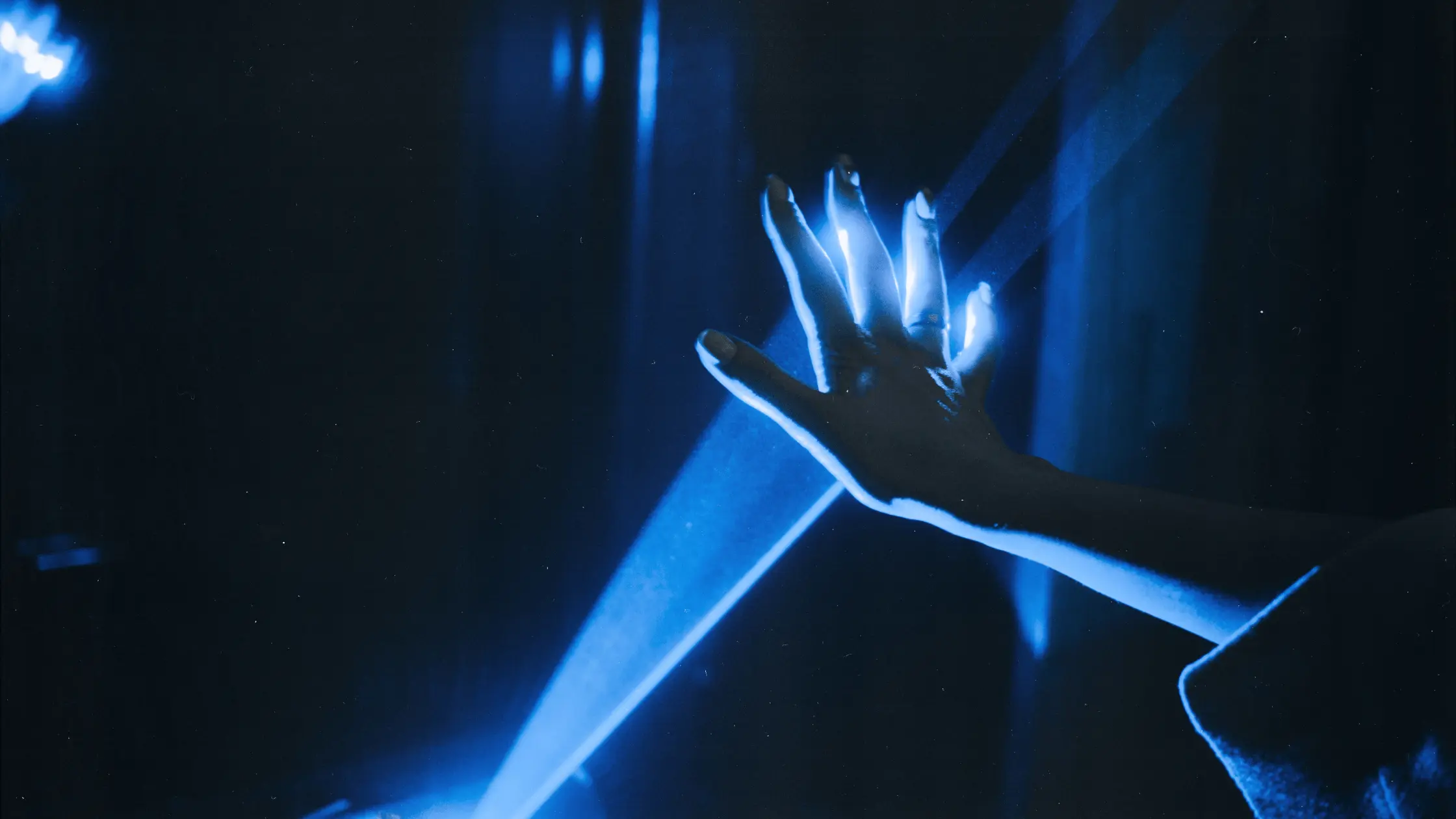The Myths Behind Blue Light
24 Oct 2022 • 8 min read

Katarzyna Woźniak

For a few years now, there have been a lot of concerns or inquiries about blue light and its supposed bad influence on our health, especially on our sight. It is commonly believed that the most significant sources of blue light are the LED screens of electronic devices. Since nowadays we use them constantly, the concerns grow and give a spark to creating false accusations and myths. It is important to not get caught up in some of those fake news or catchy titles of articles, with little insight and not much proof.
The rumours and urban legends of horrible blue light
The Internet, newspapers and others are full of terrifying stories about the effects of blue light on our eyes or health. Most people claim that this light is produced only by the LED screens or that it is fully artificial. They also state that it causes sight damage and leads to sight loss or other eye problems. To prevent this people try different methoods. They put blue light blockers on their screens, use dark modes on websites or buy glasses with filters on them.
The rumours are catchy and exciting to spread as it is always tempting to boycott something. Especially something we don't fully understand or have full knowledge about. On top of that, some marketers can catch on the wave of profit and advertise their products assuring that they help to fight the devastating effects of blue light. However, let's not get caught in all of that and repeat stereotypes or myths that have little support from sources that no one verifies.
The truth and scientific facts about blue light
Light is a part of the electromagnetic energy that takes the form of radiation which surrounds us everywhere. The range of waves, measured in their length, that goes from 380 to 750 nm is the spectrum of visible light. The longer the waves the smaller the energy carried by them.
Blue light falls into the high-intensity part of the spectrum, just right after by the UV waves that aren’t visible to human eyes.
Their sources can be natural or artificial as blue light is emitted by the Sun, LED screens, light bulbs and others.
The human body needs it badly to function properly. It is responsible for the sleep cycle as it keeps you awake and helps you concentrate. It can also improve your memory and cognitive functions or help you stay alert.
Debunking Myths
Looking at the facts above as well as having in mind the beliefs it is easy to draw lines and see the patterns of people’s confusion. Therefore let’s break down all the issues and clear a tarnished name of blue light!
Blue light is emitted only by LED screens
As we previously read it is just not true and has no scientific support. However, it is understandable because it almost feels like the truth. The sun imitates blue light. However, it contains other light colours and blue takes only around 25% of the whole radiation. As opposed to that, the light coming from the screens is perfectly manufactured and contains a lot of blue colour in its composition. Another important factor is the focus of the light rays. Nonetheless, it is not the amount of blue light coming from the sun but its intensity. The sun' blue light is even more than 10 times stronger than emitted by the iPhone in the lightest setting mode. Sun’s or light bulbs’ light is often diffused and we rarely look at them as the sources directly. In comparison to their way as we stare at the screens.
Blue Light causes damage to our eyes
When we look at the bright screens of our electronic devices it may seem like it irritates the eyes. They often feel too bright and make our eyes tired. This is why it is so easy to believe the slogans that we read. It just feels like our eyes can be damaged by them.
Nonetheless, blue light from screens does not lead to sight loss and does not cause damage to our eyes (supported by various sources like: 1,2,3,4). There has been some research about blue light killing the cells of our body. However it has been poorly conducted with wrong assumptions. This might be the reason why a lot of people caught on to this wave of false claims and justified it with this miserable study.
Eyeglasses with blue filters are the saviour!
Since people believe that blue light is harmful, they try to look for easy solutions to block it and feel the satisfaction from saving themselves. Then, just in time come clever marketers who will produce and sell anything just to get profit. There has been a lot of endorsement of products that supposedly block “harmful light” and guard our good health. Unfortunately, they do not work.
First of all, we do not need to block it at all times to prevent eyesight. Second, just the filters on the lenses do not block all of the blue light. They also do not cover our whole range of vision. Therefore, the rays may reach our eyes from around the lenses. Then it is almost pointless to purchase such goods.
What can we do?
Blue light is not causing eye damage and is not entirely harmful… Yes, not entirely.
Since most of the accusations are false and unsupported, there are just a few drawbacks to its consumption.
As mentioned before it does not lead to sight loss, but it may cause irritation. When we look at the bright screens of our electronic devices it may seem like it hurts our eyes. It's because of our focus and the amount of time spent with no rest. We may stare at one point and not blink enough, which causes dehydration. On top of that, in natural settings, we change the eyesight position. This releases the tension caused by focus, as opposed to what we do when looking at the screens.
Many people suggest the 20-20-20 rule to minimize irritation. “Every 20 minutes, shift your eyes to look at an object at least 20 feet away for at least 20 seconds”. It is also useful to use artificial tear drops to help bring back the moisture balance.
In addition, as blue light is the main factor that regulates our day-and-sleep cycles, it is important to control its consumption. It is not harmful itself, just the wrong usage of it. It is proven that it is responsible for the processes of our functioning during the day. As it wakes us up and keeps us concentrated it also keeps us from falling asleep. Therefore, if we experience trouble with falling asleep or disruptive sleep patterns, we should restrict our its consumption in the evening. Mainly from electronic devices or light bulbs. They are the only sources of blue light at this part of the day, since sun is gone.
All in harmony
Many people still hold the false belief that blue light is horrible and harmful. Like in every tale there is a grain of truth and it is understandable why there are those confusions.
It does not damage our eyes, is not only emitted by the LED screens and filters blocking it does not work. What we know is that this colour of light is present in many sources, artificial and natural too. Long hours of looking at screens may cause irritation but simple actions could calm it. The abnormal absorption of blue light late at the day may cause disruption to your sleep cycle. However, if properly restrained, it will not affect a healthy life balance. Therefore, please do not blame the blue light for things it does not cause. Instead spread the awareness and the enthusiasm for researching the secrets of the world.
Share:
Looking for expert development team?
Schedule a call with Tech Consultant
